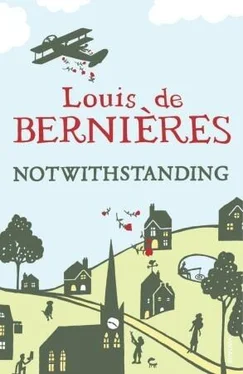Louis de Bernieres - Notwithstanding - Stories from an English Village
Здесь есть возможность читать онлайн «Louis de Bernieres - Notwithstanding - Stories from an English Village» весь текст электронной книги совершенно бесплатно (целиком полную версию без сокращений). В некоторых случаях можно слушать аудио, скачать через торрент в формате fb2 и присутствует краткое содержание. Год выпуска: 2010, Издательство: Vintage, Жанр: Современная проза, на английском языке. Описание произведения, (предисловие) а так же отзывы посетителей доступны на портале библиотеки ЛибКат.
- Название:Notwithstanding: Stories from an English Village
- Автор:
- Издательство:Vintage
- Жанр:
- Год:2010
- ISBN:нет данных
- Рейтинг книги:4 / 5. Голосов: 1
-
Избранное:Добавить в избранное
- Отзывы:
-
Ваша оценка:
- 80
- 1
- 2
- 3
- 4
- 5
Notwithstanding: Stories from an English Village: краткое содержание, описание и аннотация
Предлагаем к чтению аннотацию, описание, краткое содержание или предисловие (зависит от того, что написал сам автор книги «Notwithstanding: Stories from an English Village»). Если вы не нашли необходимую информацию о книге — напишите в комментариях, мы постараемся отыскать её.
is a funny and moving depiction of a charming vanished England.
Notwithstanding: Stories from an English Village — читать онлайн бесплатно полную книгу (весь текст) целиком
Ниже представлен текст книги, разбитый по страницам. Система сохранения места последней прочитанной страницы, позволяет с удобством читать онлайн бесплатно книгу «Notwithstanding: Stories from an English Village», без необходимости каждый раз заново искать на чём Вы остановились. Поставьте закладку, и сможете в любой момент перейти на страницу, на которой закончили чтение.
Интервал:
Закладка:
Just now, however, young Peter had been told to go and pick daffodils, at the very time when hormones were bursting to life in his body and there was nothing more important in life than not being a girl.
Adolescence had already damaged him. Nowadays his psyche had degenerated into a whirlpool of resentments, longings and animal impulse, but a couple of years before he had been so bright and intelligent that he had been able to memorise a poem in three readings. At Guildford Grammar he had regularly achieved 100 per cent in several subjects during end-of-term exams. He had won double-plus marks for his French composition. Joan used to boast that he had got his brains from her side of the family, from her father, a mathematician who even understood relativity and could calculate the dimensions of circles in his head, using pi to three decimal places.
Above all, the twelve-year-old Peter had been happy. His mind had buzzed with energy, his religious faith had been instinctive, and he had lived unquestioningly in his little universe of Latin verbs, punch-ups at school, edifying parables, catapults, yo-yos and marbles.
Like everyone else he had eagerly awaited the arrival of his first pubic hairs, without realising how much they would hurt him. He had thought that the first one was a stray hair floating on the surface of the bathwater, and had not realised that it was his until he had plucked at it in order to drop it over the side of the bath. That sharp and astonishing twinge, however, was as nothing compared to all the psychological agonies that followed.
Peter started to wonder why life was meaningless. Given his Anglican inoculation, it was perhaps strange that this should have happened. But it wasn’t that he knew life was meaningless; it was that, deep in his bowels, he began to experience it. His bones and blood began to tell him that one day they would be nothing but earth or ash.
What was it that would make the world seem like the fresh, uncomplicated place it had always been before? What was it that would restore the purpose in life that puberty had removed? He began to feel unhappy. Fits of horrible violence came over him and he wanted to go out and kill. He felt that he wanted to fight, and not stop until he was dead or victorious. He began to play furious games of football with his friends that would go on for three hours or more, because afterwards he felt purged enough to be equable for a while, to sleep peacefully. Recently he had been unable to turn his mind off at night, sweating in his sheets, tormented by everything in general and nothing in particular, a detainee and plaything of his own whirling brain and dissatisfied heart.
Nothing would have sorted Peter out except for the arrival of a large platoon of indulgent nymphomaniacs, an eventuality of little likelihood in Notwithstanding. It might at least have quietened the canker of physical longing that gnawed in his throat and guts. Even that would not have been enough, for Pandora’s box had opened more completely than that. Not only did he crave incessantly a satisfaction he could barely imagine and could not have, but he had fallen in love.
He had been in love as a child, it is true: with his hamster, with a little blonde girl at primary school, with the picture of his father as a young man, with Diana Dors and Valerie Singleton on the television, with the family dog; but these kinds of in-love did not hurt and grieve.
Now he was in love with a friend’s sister, and he was in a state of spiritual pain. She was chestnut-haired and freckled, skinny and bouncy. In the summer her freckles joined up. She was slightly croaky in the voice, and she was a Methodist, which didn’t seem to matter now, because love had made him broad-minded. He knew nothing about Methodists apart from the fact that they didn’t burn people at the stake, were opposed to enjoyment and might not be proper Christians. Because of her voice, everyone called her Froggy. She was twelve, she lived half a mile away up the hill, and she and Peter’s little sister spent much of their time together, giggling a great deal and conspiring in hushed voices. One of their favourite topics was discussing what it might be like to have periods, how big their breasts were likely to grow once they got started, and how relatively ‘developed’ were the various friends they knew. They were fascinated by sex, but knew that it was immoral and that any girl who had it was a tart. Peter knew, contrariwise, that any boy who had it was inconceivably lucky.
Froggy was also in love with Peter, but they hardly ever spoke. They could think of nothing to say, too tongue-tied and awkward to speak to each other at all. They never managed more than ‘hello’, and Peter spent most of his time with his friend Robert, and Froggy’s brothers. They liked to collect conkers or small dead animals, and put them on the railway line, just to see what the trains did to them.
Instead of speaking, Froggy and Peter exchanged a whirlwind of letters. Hers he would always keep. ‘ My Darling One … I miss you ,’ she would begin. When they arrived his heart would leap at the sight of the rounded handwriting. The letters were breathless with longing, incandescent with passion. ‘ My darling darling darling,’ they read, followed by pages of news about her friend Andrea, and about the savage teachers who attacked and oppressed them at school. Froggy wrote, ‘I love you, my darling, I love you ’, and she concluded her letters with ‘All my everlasting love ’, or ‘All my tons and tons of all my special love ever faithful’ .
Their epistolary passion had endured for a year and yet they had never held hands, kissed, or said anything other than ‘hello’. On the day before his mother’s request to go and pick daffodils, however, a day of the spring holidays, he had contrived to break the impasse, by slipping a note into Froggy’s plastic adolescent handbag. He did it on two false assumptions, the first being that girls go through their handbags every day, and the second, that upon finding the note she would come to the assignation. He did not know that women are not what you think; they have hesitations and peculiar fears, a sense of right-timing and self-preservation that is obscure to men. Neither did he know that a handbag, even that of a twelve-year-old, contains more than a woman’s essential supplies. His note vanished into a congeries of brush, purse, broken biscuits, tissues, coagulated make-up, old bus tickets and chocolate wrappers, much of it being of extraordinary antiquity. The note read: ‘Come and meet me at the Maclachlan bench at two thirty tomorrow. Today is Tuesday .’ It had not been easy to find a moment when he could put the note in her bag, but somehow he had done so when she had left it momentarily abandoned in the hall while she was upstairs, giggling with his sister.
Peter did not know precisely what he and she would do up on the common at the Maclachlan bench. Perhaps they would kiss, hold hands, declare their love outright. Perhaps she would take him in her arms and he would feel the length of her sweet and burgeoning body against his. Peter did not imagine that they would have sex. If he had known that it was imaginable, he certainly would have imagined it. He was in love, and he thought he knew the cod wisdom, frequently passed on from his mother while his father sat in resentful silence, that sex and love were different and not really connected.
Peter did not sleep at all that night, and was forced to sit up and read a book. He read Lady Chatterley’s Lover , which his parents had hidden on the shelf in a brown wrapper, making it the most obviously tempting book in the house. His parents might just as well have written on its spine ‘Attention all children! Read this book! It’s got sex!’ All the children did read it, and none of them understood it much. In any case, the book wasn’t as explicit as they might have hoped. Peter read it that night without taking it in. He was too much consumed with anxiety and speculation.
Читать дальшеИнтервал:
Закладка:
Похожие книги на «Notwithstanding: Stories from an English Village»
Представляем Вашему вниманию похожие книги на «Notwithstanding: Stories from an English Village» списком для выбора. Мы отобрали схожую по названию и смыслу литературу в надежде предоставить читателям больше вариантов отыскать новые, интересные, ещё непрочитанные произведения.
Обсуждение, отзывы о книге «Notwithstanding: Stories from an English Village» и просто собственные мнения читателей. Оставьте ваши комментарии, напишите, что Вы думаете о произведении, его смысле или главных героях. Укажите что конкретно понравилось, а что нет, и почему Вы так считаете.












